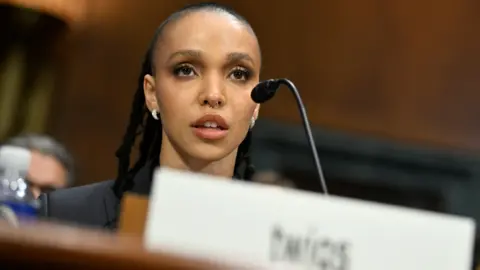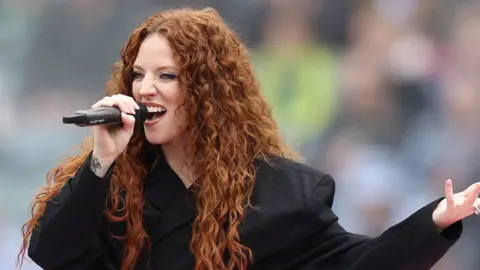FKA Twigs uses AI to create deepfake of herself
 Getty Images
Getty ImagesFKA Twigs has revealed she has used artificial intelligence to create a deepfake of herself that will interact with fans and journalists so she can focus on her music.
The British singer, dancer and actress told a US Senate Judiciary subcommittee on Tuesday that celebrities and artists should have control over how their voices, looks and personalities are used by AI.
"In the past year, I have developed my own deepfake version of myself that is not only trained in my personality but that also can use my exact tone of voice to speak many languages," she said.
"These and similar technologies are highly valuable tools. This, however, is all under my control and I can grant or refuse consent in a way that is meaningful.
"What is not acceptable is when my art and my identity can simply be taken by a third party and exploited falsely for their own gain without my consent due to the absence of appropriate legislative control."
She added that her digital clone would be able to communicate in French, Korean and Japanese.
"It means that even with my upcoming album, I can really explain in depth what it's about creatively," she said.
"It also allows me to spend more time making art. Often being a music artist, or any artist in this day and age requires a lot of press and a lot of promo, a lot of one-liners.
"So it means if it's something simple that doesn't really require my heart, I can do a one-liner and give it to people to promote a piece of work and it's harmless, but ultimately I can spend more time making something that's really meaningful for my fans."
In further written evidence, she said her "AI twigs" would be deployed later this year "to extend my reach and handle my online social media interactions, whilst I continue to focus on my art from the comfort and solace of my studio".
The star argued that other people shouldn't be allowed to use an artist's voice and other features without their consent, saying that creators' "careers and livelihoods are in jeopardy" if there is not legislation to regulate the use of AI.
"There are songs online - collaborations with myself and other artists - that I didn't make," she told the committee.
"It makes me feel vulnerable because, first of all, as an artist, the thing that I love about what I do is that I'm very precise. I take my time with things and I'm very proud of my work.
"So the fact that somebody could take my voice, change lyrics, change messaging, maybe work with an artist that I didn't want to work with, or maybe work with an artist that I wanted to work with and now the surprise is ruined - it really leaves me very raw and very vulnerable."
 Getty Images
Getty ImagesThe use of AI to impersonate the voices and images of well-known singers and rappers has been growing.
In early April, Jess Glynne, Mumford and Sons, Sam Smith and Zayn Malik were among the British artists who signed an international open letter calling for more protection against "the predatory use of AI to steal artists' voices and likenesses".
On Wednesday, a group of UK MPs published a report suggesting that musicians and other celebrities should be protected by a law that would ban AI-generated deepfakes in the UK.
The All-Party Parliamentary Group on Music said there should be legislation including "a specific personality right to protect creators and artists from misappropriation and false endorsement".
Such a law should also include other measures to protect musicians from the risk of AI becoming "a destroyer of creators' livelihoods", the MPs said in a report published on Wednesday.
Politicians must "confront the danger that unfettered developments in AI could pose to the UK’s musicians and music businesses", said the cross-party group's chair, Labour MP Kevin Brennan.
But the power of AI can also be a force for good to "help musicians to innovate and to inspire new human creativity", he added.
"We ignore the necessity to sow policies, which will harvest the benefits of AI, and help stave off the threats it poses, at our peril," Mr Brennan said.
"Our central insight must always be that AI can be a great servant but would be a terrible master."
In response, a government spokesperson said: "We are committed to helping artists and the creative industries work with the AI sector to harness the opportunities this technology provides, and ensure our music can continue to be enjoyed around the world.
“Trust and transparency are vital to this shared approach. We are working closely with stakeholders and will provide a further update in due course.”
The government has already pledged that the creation of sexually explicit deepfake images will be made a criminal offence in England and Wales.
